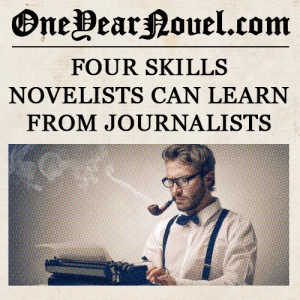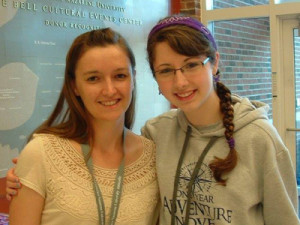4 Skills Novelists Can Learn from Journalists
 Brynn Fitzsimmons, Guest Contributor
Brynn Fitzsimmons, Guest Contributor
Journalism caught me unawares. When an editor offered me a journalism job in my university’s communications department, I told him he was crazy. I am a novelist—a fantasy novelist. You do not get farther from journalism than that, right?
A few years later, I got a job as a reporter at the small-town newspaper, where I still work.
What took me aback is that journalism is not quite so different from writing fiction as I had anticipated. Journalism is still writing, and, which is more, journalism is storytelling. Which means (surprise) that journalism affects novel writing. In fact, other than The One Year Adventure Novel, journalism is the best thing that has ever happened to me as a writer.
Today, I could go on for hours about what I’ve learned from journalism. Here are four skills that stick out.
1. Be brief.
Brevity is next to godliness—because it’s like cleanliness for writing. No one likes their house cluttered with unnecessary junk, and no one enjoys writing cluttered with unnecessary words.
The process of cutting a story to get it within max word count is probably the single most useful skill I ever learned for revising a story. When you write 750 words, lay the story on the page and realize you only have room for about 500, you start getting creative with how you give the most information in the smallest space possible.
While varied sentence structure makes fiction prose interesting, journalism’s other rule of thumb still applies: if a sentence is over 25 words, it’s too long. My first editor was adamant that my sentences be subject-verb-object, which was annoying at the time, but something I am grateful for now.
Try this sometime: take 900 words of whatever you’re writing, paste it into a document, and cut it to 600 words. Even if you think it’s impossible (it will probably feel impossible when you get to about 750), make yourself do it—one adverb or article at a time.
Words become precious when you work within a limit, and that’s a good thing to remember. Words are a gift, no matter what kind of writing you do. Journalism teaches you to treat them as such.
2. Get to the point.
Sadly, we have to rewrite freelance news stories rather often, and we inevitably end up throwing up our hands and saying, “Why did he put this in here?! No one cares!”
As a journalist, your thought process has to be, “Does my reader need this information? And does he need the information in paragraph one more than he needs the information in paragraph three?”
By the way, he should need the information in paragraph one more than the information in three. If that isn’t the case, someone didn’t write the story well.
In novels, especially fantasy and sci-fi, we are tempted to give a lot of semi-useless (but possibly interesting) information near the beginning of the novel or chapter. The thought process to fix that is the same:
Does my reader need to know this?
Does he need to know it right now?
If it’s too hard to figure out what your story is about, the reader will move on to something he can understand—whether it’s another news article, or another novel.
3. Ask questions.
The key to a great interview is to doggedly keep asking questions. In theory, you should ask good questions. Interestingly enough, though, my best content often comes from questions I ask in a desperate attempt to keep the conversation going while I try to catch up on my notes.
Your stories are the same way.
In fact, one of the great things about The One Year Adventure Novel is that it teaches us to outline by asking questions. That’s all The Map is—a series of interview questions.
As a journalist, I usually go into an interview with a set of questions as well, but I never stick to them. I always ask follow-up questions and follow-up questions to the follow-up questions. As novelists, we have to do the same thing. The Map is a great starting point, but there are many, many more questions to ask, both of our stories and of the world around us.
At the 2014 Summer Workshop, Mark Wilson talked about how it is a writer’s job to ask hard questions. He was right. If you are a writer—journalist or otherwise—questions aren’t just a writing thing. They are a way of life. Ask questions of anything and everything (and take notes)—because eventually you will hit on the questions that really need to be asked, that you really need to answer.
4. Watch for stories – because they are everywhere.
I wasn’t at the newspaper very long before my editor started asking me to, “Keep your ears open for potential stories.”
Here’s the thing. This town has 3,300 people in it. Nothing happens. The most exciting thing in a given week is that the library hosted a children’s event and somebody from the 4-H club won second place at a fair. How could I possibly find stories in a town where nothing happened?
And then I watched my editor. For her, a new restaurant opening turns into a story on the owners and their passion for green energy and local food. The man coming in to renew a subscription turns into a story on his extensive military career. An announcement of a walk benefit for cancer research turns into a story on a lady who’s been fighting cancer for years.
The person you pass on the sidewalk could probably make the front page if they had someone to tell their story.
As a writer—whether journalist or novelist—that’s your job: to see the stories in every day. Everyone and everything has a story—they just need you to tell it.
…
What do you think? Would you consider a journalism job as a fiction writer? Why or why not?
…

Brynn (right) with Tineke Bryson at the 2015 Summer Workshop
About Brynn
Brynn is a senior Humanities Letters major/writing minor at Maranatha Baptist University in Watertown, Wisconsin. She is looking forward to where God will take her in writing after graduation, and someday she hopes to teach in a college classroom. She recently realized she needs to get another hobby besides writing, but has yet to find anything she loves as much. However, she does enjoy reading, playing the violin and the harp, and watching Lord of the Rings and Marvel films with her sisters.



This article makes me want to be a journalist just because you make it seem possible. It is the same thing that Mr. S does with One Year Adventure Novel–he makes being a writer seem possible. And in some strange way, it reminds me of “all things are possible through Christ” even when those things seem very unlike me.
Your last point pierced my heart when I first read Sherwood Anderson’s Winesberg, Ohio. I was given a copy by my first college writing teacher after I complained about how boring Myrtle Point was. It opened my eyes to the high drama, tragedy, and beauty of life in even the smallest town. Your advice is true and beautifully expressed.